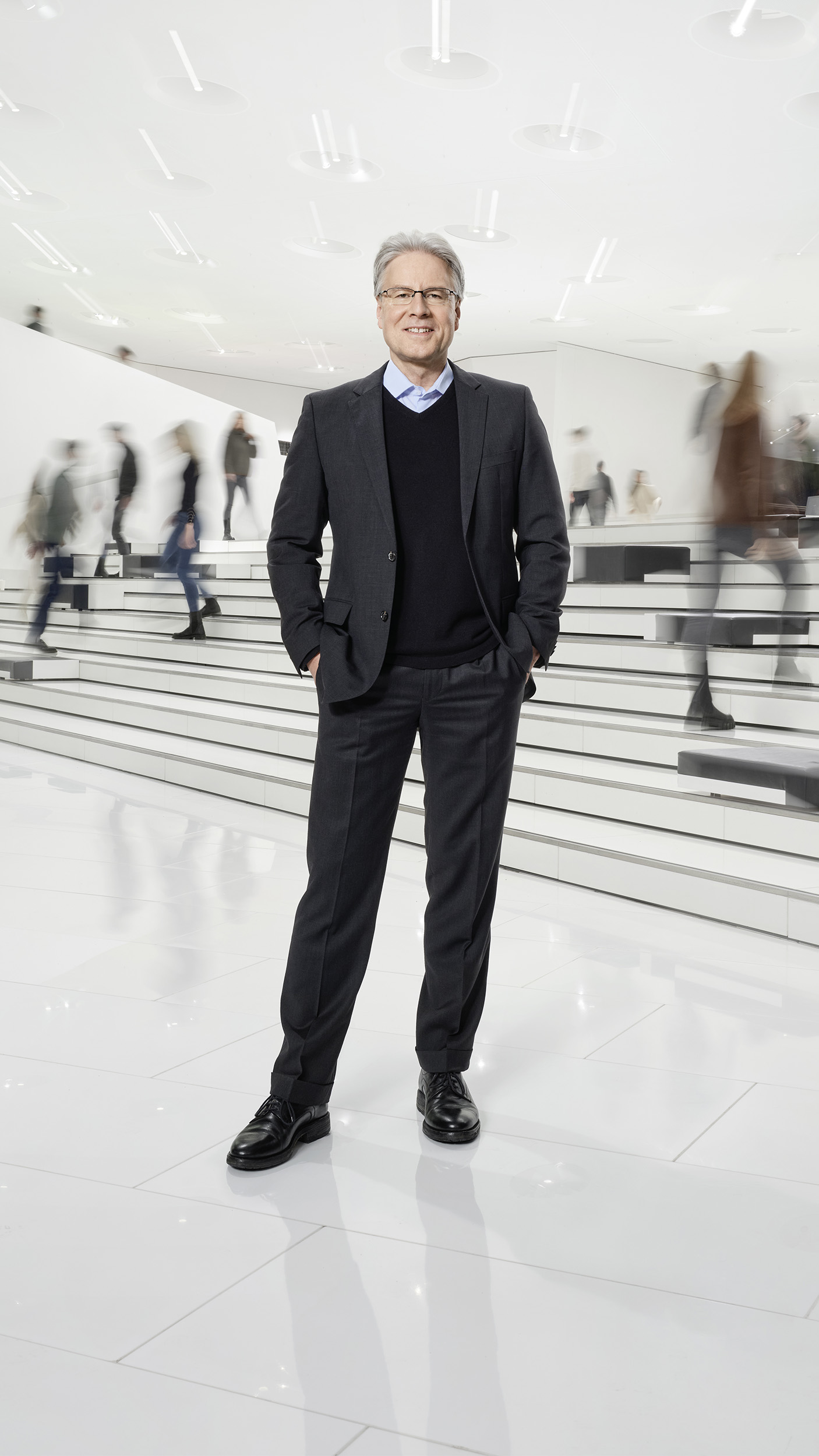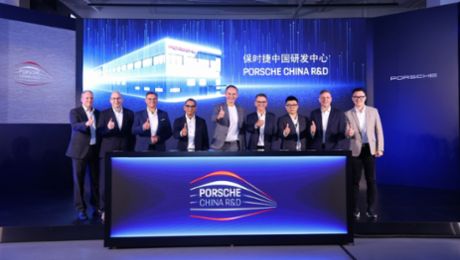A semiconductor factory in China closes due to a coronavirus outbreak. A container ship gets stuck in the Suez Canal. War breaks out in Europe, resulting in an energy crisis. Headlines like these can shake people to their core. For around 700 procurement employees under Barbara Frenkel, a member of the Executive Board, they also require urgent action. Frenkel is responsible for an annual purchasing volume of more than €14 billion—as well as for her team.
“There are opportunities in every crisis. That’s what I concentrate on. Positive thinking can help you focus on issues that can be influenced,” says Frenkel. “It takes resilience in stressful situations, clear goals and intensive communication to find good solutions under pressure.”
After all, it’s always people who shape change, contribute new ideas, and develop effective alternative strategies, whether externally, with the more than 7,000 Porsche partners around the world, or in internal dialogue.
Take semiconductors as an example: With around 5,000 microchips installed in each Porsche Taycan, interruptions in the supply chain can turn vehicle production upside down. Dual sourcing, which entails expanding the partner portfolio, can be a successful security measure. “We’ve since approved an alternative component for some critical semiconductors,” explains Frenkel. “We also take a critical look at every component to determine whether a certain level of inventory makes sense.” Prioritizing certain cars in production is another sensible option for getting through any shortages.
Take wiring harness as an example: More than 4,000 employees produce wiring harnesses for Porsche in Ukraine. “We know these suppliers well. The difficult situation there has an impact on us, of course,” says Frenkel, who still stands behind the company out of a sense of solidarity and because it delivers good quality.
We’re creating the conditions to secure jobs over the long term. Andreas Haffner, Member of the Executive Board responsible for Human Resources and Social Affairs
But she does need a plan B. Within a few months, the systems and tools used in Ukraine were duplicated and set up in other countries. “Especially when there’s a crisis, there’s more than one solution in procurement. We’ve developed a whole host of measures for better securing the supply and we continue to expand and optimize them.” The past few years have seen a dramatic change in the procurement industry, which operates much like a hinge—like a moving connection between the inside and outside. Procurement has long been a driver of innovation and a source of strategic ideas, which is one of the reasons why Barbara Frenkel’s office is located at the Porsche Weissach Development Center. eFuels production in Chile is another good example. It takes new structures and areas of expertise to fulfill all of the new tasks and ensure robust finances even in volatile times. In other words, it takes change management and workforce transformation.
“Especially in Barbara Frenkel’s department, last-minute changes resulting from external influences can be particularly challenging,” says Andreas Haffner, Member of the Executive Board responsible for Human Resources and Social Affairs—and thus for more than 40,000 employees around the world. “But as a fundamental concept, transformation affects our entire company and the entire industry. There’s no need to be afraid of electrification, automation, digitalization and artificial intelligence. We welcome these transformation megatrends and plan to exploit them for us as a team.”
It’s likely that one in four employees will have to learn a new trade or change responsibilities. “We plan to take everyone with us on our journey,” emphasizes Haffner. “We’re creating the conditions to secure jobs over the long term, which is why we launched one of the largest qualification campaigns in company history.
There are opportunities in every crisis. Positive thinking can help you focus on issues that can be influenced. Barbara Frenkel, Member of the Executive Board responsible for Procurement
Using transformation maps and strategic personnel planning, we have a concrete plan for how to prepare our team for the future. For example, we’ve responded to the shortage of IT architects with our own studies program and are now training them ourselves.”
Take Zuffenhausen plant as an example: production of the Taycan kicked off in 2019, creating more than 2,000 new jobs. Porsche recruited about one third of the team from within the company and spent months training them for their new responsibilities.
Take the Leipzig plant as an example: to ensure successful conversion of the production facility for the all-electric Macan, about 6,000 participants were trained in qualification measures through to the end of October 2023.
“We provide individual transformation and training consultation as well as internal and external qualifications. We also make it easier to change roles and offer job shadowing opportunities and trial periods, allowing employees to get acquainted with new departments,” says Haffner. “This flexibility can be helpful in providing guidance. That’s how we consolidate our power to innovate over the long term.
Porsche uses a variety of channels to communicate offers, from internet, intranet, and social media to the award-winning employee magazine _Carrera_ and the associated TV format. “Porsche Transformation Days” are elaborate internal trade fairs that have proven to be an effective tool for actively integrating the team. All the departments have the opportunity to present themselves with transformation topics that offer visual and physical experiences, from drive technology and data management to 3D printing and AI. “Transparent information, shared experiences, and personal conversations spark new ideas and can thereby transform concern into enthusiasm,” says Haffner. A fluctuation rate below one percent is confirmation that the Porsche Workforce Transformation measures are effective. This wouldn’t be possible without all of the different programs dedicated to issues such as health, flexible work models, retirement plans, and a healthy work-life balance. The “Porsche hilft” initiative is a simple way to provide employees with suitable volunteer options and thus enable a change in perspective like no other.
External surveys confirm that Porsche is one of the most popular employers. In fact, the company took first place in the areas of business science and engineering in the Universum 2023 employer study, which surveyed 21,000 students. The questionnaire filled out by 12,000 academics with career experience provided the same results. In the computer science segment, student selections placed Porsche in fourth place. The wide range of skilled occupations in the Group and even the opportunity for a dual work-study program also offer good career opportunities. “We’re always updating our offers and in some cases even overhauling them to ensure we remain attractive both internally and externally,” explains Haffner.
For Procurement and Human Resources, creating stability in change means always thinking about today, but also about tomorrow and the day after. And that requires a keen eye for visions and visionaries, as well as for companies and people who enrich Porsche, particularly because they’re different and add to diversity. A variety of perspectives is a key driver when it comes to shaping change. “It may be more challenging to collaborate in diverse teams than in homogenous ones, where everyone has the same opinion. But it’s also much more innovative, creative, and productive,” says Haffner. “We want to raise awareness. A workforce with 19 percent women is just not good enough.” His department launched a company-wide initiative to establish diversity in everyday operations, with measures that focus on a variety of areas such as targeted recruiting formats, mentoring programs, and communication networks.
A key supporter is Barbara Frenkel, whose own career has been shaped by curiosity, courage, and change. With a degree in chemistry and rubber technology, she joined Porsche as Manager of Quality Methods and Systems in 2001. She was later appointed Head of Sales for Europe and ultimately assumed responsibility for procurement as the first woman on the Executive Board. “I got to know both ends of the value chain,” she says. She introduces colleagues who make a difference at Porsche in LinkedIn videos and shares career tips in interviews. Frenkel has increased the percentage of women in her department to around 40 percent. Haffner, who is a qualified lawyer and has been involved in Human Resources at Porsche since 1997, joined his team on Christopher Street Day sporting rainbow colors in line with the motto: Unique alone. Diverse collectively. Successful together. “It doesn’t matter to us where you come from, how old you are, who you love, or which gender you identify as,” he emphasizes.
Whether you’re purchasing a Porsche or joining the company, you’re not only choosing a brand, but also a unique community—a family that has developed over generations, always views change as an opportunity, and achieves key milestones in an environment of change.
The content of this website presents selected information from the annual and sustainability report 2023 of Porsche AG. All information therefore relates to the reporting date and has not been updated since its publication on March 12, 2024. The German PDF document of the annual and sustainability report is legally binding.





